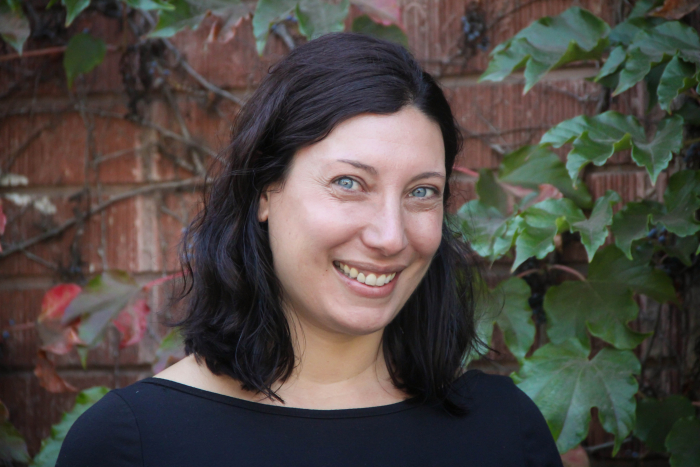This past fall, Scripps College welcomed Corrina Lesser as the new director of public events and community programs. Lesser was previously director of programming and planning for the Chicago Humanities Festival, where she helped curate annual programs as well as single events focused on cultivating public engagement with visual art, music, literature, history, film, performance, and other topics in the humanities. The Office of Marketing and Communications recently sat down with Lesser to talk about her background, her interest in events programming, and her debut series for the College, “Conversations.”
Scripps College: How did you become interested in curating events?
Corrina Lesser: I like to say I’m a part of the family business—my father and mother started a coffeehouse when I was about five years old. It was called Java Jive, and they brought some of the most iconic folk and bluegrass musicians of the time—Doc Watson, Norman and Nancy Blake, Taj Mahal, John Hartford—to our very small town in Upstate New York. It was the first experience I had of loving something (in this case, music) and seeing that there was a way to go beyond listening to it on the record player. I loved making personal connections with the musicians, and it was a revelation to see them perform live and connect so deeply with their audiences.
SC: You must be a voracious reader and consumer of culture to be able to stay abreast of everything happening in the world of the humanities. Can you tell us a little about how you keep up, and how you decide whom to include when you are putting a program together?
CL: I do really love to read, and I spent some of my formative years training as a journalist, so I also really like to listen. My research is, at minimum, twofold. I absorb as much as I can through popular media such as the New York Times, the New Yorker, and NPR, but also through online culture blogs like the Rumpus, the Millions, and the LA Review of Books. I also really value the blog Public Books—it’s an amazing place to get a feel for how academics are writing about culture for general audiences and to learn about what writers, artists, performers, and academics are preoccupied by right now. Understanding academics’ interests and obsessions, I have found, has been an excellent bellwether in determining what might make for a relevant and intriguing program. This approach also helps me go beyond my own cultural limitations and interests. That said, I really try to program events that I’m passionate about—I want to be able to stand behind my choices and provide a forum for creativity and conversation that I want to be a part of as a member of the community.
SC: “Conversations” features high-profile activists, politicians, dancers, and writers talking about their work with interlocutors. Why did you decide on this format for the program, and what do you think a conversation offers that a talk or lecture might miss?
CL: I am total evangelist for the conversation-style format! Sure, there are many people who can stand up and give a solo talk, and we’ll all be riveted (not to name names, but Salman Rushdie and Elizabeth Gilbert both come to mind). That said, I think as an audience member you get something much more special when you put someone on stage with an interlocutor. It’s a chance to pair people up who you think will have something to say to each other. For instance, I am excited to have Angela Davis in conversation with Annie Gilberton from Southern California Public Radio. Annie has been covering education for years and she’s based in Los Angeles and has been reporting on all sorts of topics I know resonate with our Scripps community, especially issues on student activism. Who better, then, to talk with Davis? This event format gives us a chance to have a specific and focused discussion of what’s relevant to us and, just as important, allows us to take part in a conversation that’s never happened before because it’s been tailored just for us.
SC: Is there a fact about yourself that is surprising, or that people don’t know about, that you’d like to share?
CL: For someone who makes her living as a professional planner, I like to do something really impulsive every 10 years or so. In 2004, while I was moving (or so I thought) to San Francisco, I stopped in Boulder, Colorado, and just decided to stay. It was one of the best decisions I ever made. I ended up working at the Jack Kerouac School of Disembodied Poetics, which was founded by the poets Allen Ginsberg and Anne Waldman. It was a most unusual place, but it changed my life in so many wild and wonderful ways, for which I’m still very grateful. Turns out you should always leave room for the unexpected!
For more of our Spotlight on Staff series, click here.


